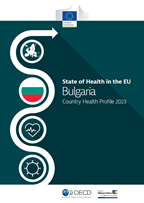HSPM
Health Systems and Policy Monitor



Bulgaria has a compulsory social health insurance (SHI) scheme, with a small role for Voluntary Health Insurance (VHI). The Ministry of Health is responsible for regulating and coordinating the health system as well as for licensing a dense network of health care providers, including hospitals. Within the SHI, the National Health Insurance Fund (NHIF) and its regional branches is the sole purchaser of health services. There is a mixed public–private health care financing system. SHI contributions and taxes drive public funding, while out-of-pocket (OOP) payments, VHI premiums, corporate payments and donations drive private funding. EU programmes support structural reform and human resources development.
Universal health coverage is regulated by law; however, a significant proportion of the population is uninsured (approximately 11 to 12%). The statutory benefits package covers a range of primary, secondary and tertiary level health services and goods, and increasingly more preventative services. User fees are common, driving high rates of OOP spending, although certain services and goods are fully financed by the state budget, such as emergency care, inpatient mental health care and public health services.
Public health and district health policies are organized and implemented by regional health inspectorates (RHIs), which are local bodies of the Ministry of Health. Patients have free choice of general practitioners (GPs), specialized out-patient providers and hospitals. GPs, who are independent practitioners contracted by the NHIF, operate in individual or group practices. As gatekeepers, they provide referrals to diagnostic testing, outpatient specialized and hospital care. Quarterly quotas control the volume of services by limiting the number of referrals that physicians may write.
Outpatient specialist care is delivered mainly by a network of private practices specializing in one area, multi-professional medical and medico-dental centres, diagnostic-consultative centres, diagnostic laboratories, centres for dermatology and sexually transmitted infections, comprehensive cancer centres, mental health centres and centres providing comprehensive services for children with disabilities and chronic diseases. Efforts to develop integrated care are ongoing. Public hospitals are owned by the state (20%) and municipalities (more than 40%); for others, ownership is shared. There are also private, for-profit multi-profile and specialized hospitals.
Subscribe to our newsletter
Sign Up